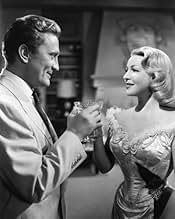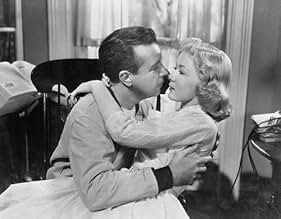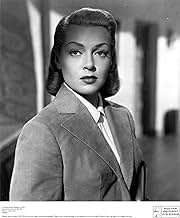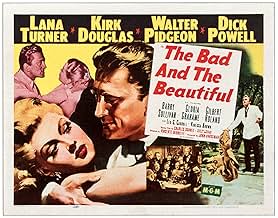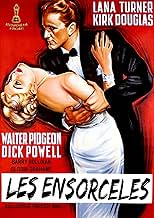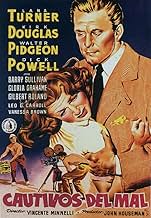AVALIAÇÃO DA IMDb
7,7/10
17 mil
SUA AVALIAÇÃO
Um produtor de filmes sem escrúpulos usa uma atriz, um diretor e um escritor para alcançar o sucesso.Um produtor de filmes sem escrúpulos usa uma atriz, um diretor e um escritor para alcançar o sucesso.Um produtor de filmes sem escrúpulos usa uma atriz, um diretor e um escritor para alcançar o sucesso.
- Direção
- Roteiristas
- Artistas
- Ganhou 5 Oscars
- 7 vitórias e 7 indicações no total
Jay Adler
- Mr. Z - Party Guest
- (não creditado)
Stanley Andrews
- Sheriff
- (não creditado)
Del Armstrong
- Georgia's Makeup Artist - Screen Test Scene
- (não creditado)
Ben Astar
- Joe - Party Guest
- (não creditado)
Barbara Billingsley
- Evelyn Lucien - Costumer
- (não creditado)
- Direção
- Roteiristas
- Elenco e equipe completos
- Produção, bilheteria e muito mais no IMDbPro
Avaliações em destaque
Part of what makes this film good is that Kirk Douglas's character is not shown as being completely evil - he manipulates people and can be ruthless about discarding them, but he's got real talent and is good for the career of everyone he comes in contact with. "Don't worry, some of the best movies are made by people working together who hate each other's guts," he says at one point, showing that (at least after he's established his own name) he cares most about making quality movies. I found authenticity in the nuances of this personality - he's ambitious, driven, knows how to get his way and the most out of other people, is self-aware, discerning, and artistic. Oh, and he's also kind of an asshole.
It's a film that starts slow and perhaps takes a little too long establishing his character, and the first story is a little less interesting than the two which follow. The film is told in flashbacks and explains how a director (Barry Sullivan), actor (Lana Turner), and a screenwriter (Dick Powell) don't want anything to do with him anymore after he runs afoul of each in different ways over his career. You see, he's calling them up now and hoping each will work on a new project of his, and none of them even want to talk to him.
The film really picks up with Turner; she turns in a strong performance and I loved the pathos of her story. She plays the alcoholic daughter of a great actor who doesn't have the same talent, and yet Douglas recognizes her star power. The scene where he starts questioning the shrine she has to her father and she attacks him was the point at which I thought the film may really have something. Powell is good too, and aided considerably by Gloria Grahame, who plays his wife and appears at about the 1:20 point and then lights up the screen for the moments she's on it, southern accent and all. What passion there is in the way she kisses Powell's character, and how she says "James Lee, you have a very naughty mind...I'm happy to say." The film's biggest moment belongs to Douglas however, when he explodes at Turner after she comes to his place following an opening night party - one that certainly must be among the best in his career.
Overall, it's an interesting look at Hollywood, and more generally, talent and ambition. I wasn't sure what would happen once the flashbacks were told and we returned to the present, and thought the ending was clever too.
It's a film that starts slow and perhaps takes a little too long establishing his character, and the first story is a little less interesting than the two which follow. The film is told in flashbacks and explains how a director (Barry Sullivan), actor (Lana Turner), and a screenwriter (Dick Powell) don't want anything to do with him anymore after he runs afoul of each in different ways over his career. You see, he's calling them up now and hoping each will work on a new project of his, and none of them even want to talk to him.
The film really picks up with Turner; she turns in a strong performance and I loved the pathos of her story. She plays the alcoholic daughter of a great actor who doesn't have the same talent, and yet Douglas recognizes her star power. The scene where he starts questioning the shrine she has to her father and she attacks him was the point at which I thought the film may really have something. Powell is good too, and aided considerably by Gloria Grahame, who plays his wife and appears at about the 1:20 point and then lights up the screen for the moments she's on it, southern accent and all. What passion there is in the way she kisses Powell's character, and how she says "James Lee, you have a very naughty mind...I'm happy to say." The film's biggest moment belongs to Douglas however, when he explodes at Turner after she comes to his place following an opening night party - one that certainly must be among the best in his career.
Overall, it's an interesting look at Hollywood, and more generally, talent and ambition. I wasn't sure what would happen once the flashbacks were told and we returned to the present, and thought the ending was clever too.
My tribute to the great Hollywood film composer, David Raksin, is long overdue. I only discovered the other day that he died a couple of summers ago at the considerable age of 92. I suppose I had thought that like most of those figures who reached their peak in the middle of the last century he had passed away many years ago. A re-seeing of "The Bad and the Beautiful" fairly recently reminded me of just how outstanding was his contribution to movies of all shades of quality. I first became aware of the uniqueness of the Raksin 'sound' on my original viewing of Wyler's "Carrie" in 1952. It is impossible to define, other than to say that it owes nothing to central European romanticism, the sound of almost all the in-house studio composers such as Newman, Stothart and Steiner, or to the tradition of 20th century symphonists such as Copland and Diamond which fed the imagination of film composers as diverse as Elmer Bernstein and David Amram. Raksin had a sound all his own as did Bernard Herrmann and Miklos Rozsa, as instantly recognisable as theirs but I feel his range is wider. He seldom repeated himself as did Rozsa who composed in the same style regardless of genre. ("Double Idemnity", "Ben-Hur" and "Madame Bovary" have nothing common apart from their same sort of watered down Kodaly-like music.) His style is intensely lyrical, conceived with a verve and passion that always transcended the most trivial movies and made them, if not worth watching, always worth listening to. Unlike many of his colleagues he seldom hit the jackpot by working on films of great quality. I think it only happened twice, with Abraham Polonsky's B movie "Force of Evil" which has become recognised as a marvellous example of film noir and of course William Wyler's "Carrie" where he was just one of many outstanding contributors to what I have long argued is possibly the greatest work of art to have ever emerged from the Hollywood studio system. Although it has its passionate advocates, I cannot share their enthusiasm for Vincente Minnelli's "The Bad and the Beautiful". It is certainly very professional in the way it slickly dissects an unsympathetic character through the flashback reminiscences of those he mistreated, but it had all been done before and considerably better in "Citizen Kane" and "All About Eve". However the film is worth watching if only to wallow in Raksin's gorgeous score. And there is plenty of it, particularly in accompanying all those voice-off narrations. And then just as one is beginning to wonder if the marvellous opening credit theme is about to be heard once too often, the composer introduces something entirely new for the Dick Powell narrative, a jaunty section based on a four-note motif (a falling perfect fifth, rising up a major sixth, then down a major seventh). The way this is subsequently developed is truly symphonic. Incidentally if you want to discover a film score that has the length and complexity of a symphony just close your eyes (you won't be missing much) and listen to "Forever Amber". Raksin in excelsis!
During this time in the early 50s there were quite a number of Hollywood pictures which scrutinised and often satirised Hollywood itself. The old studio system had been seriously weakened in the war years, the young crop of independent producers and writer-directors were gaining ever more prominence, and the dream factory as a whole had become a little more introspective, not to mention cynical. But while Sunset Boulevard, All About Eve (about the theatre, but the point carries through) and Singin' in the Rain aimed their sights at the injustice and hypocrisy of the star system, The Bad and the Beautiful takes on the thorny issue of creative control.
The Bad and the Beautiful is referenced extensively in auteurist Martin Scorsese's 1995 documentary on American movies, as an explanation of the antagonism between a producer's commercial drive and a director's artistic one. However it is far from a validation of auteur theory, for while it emphasises the importance of the director's role, it also points out (quite correctly) the equally crucial contributions of the writer and the producer himself. Incidentally the actual producer of The Bad and the Beautiful is John Houseman, primarily an actor who really only dabbled (albeit quite successfully) in production, and thus someone who could perhaps afford to snipe from the sidelines. Oddly enough screenwriter Charles Schnee would also turn to producing soon after this. He certainly shows extensive insider knowledge of the industry.
The director of The Bad and The Beautiful is Vincente Minnelli, a man whose flowing and extravagant style was put to best use in the musical genre, and although he was certainly competent in drama he does tend to overdo things a little for the form. One typically impressive Minnelli manoeuvre is the lengthy tracking shot at the party about fifteen minutes in, in which the camera is "carried" from one character to the next, while the careful arrangement of extras draws our eyes from one point of focus to another, a woman singing beautifully yet unnoticed in one corner, while a gossipy starlet is surrounded by a gaggle of admirers in another. Minnelli's tendency to keep all the characters in shot together during dialogue scenes means there is no need for back-and-forth editing. When there is a cut it is a meaningful jump, such as the close-up when Sullivan is told he won't be directing Shield's first big picture. Ultimately though the elaborate nature of Minnelli's direction is disproportionate to the needs of the picture, and a more stripped-down approach could have intensified the drama.
Another lesson The Bad and the Beautiful teaches us, both through its plot and its own example, is the importance of the right actors in a production. The majority of players in this large ensemble cast tend towards a uniform competence. People like Walter Pidgeon, Barry Sullivan and Vanessa Brown give steady, solid performances, not outstanding but apt to their characters. Dick Powell has a neat writer-ish cynicism to him, and it is only him and the vivacious Gloria Grahame that threaten to steal the show. A gratingly melodramatic Lana Turner is the only conspicuously bad player. However at the heart of The Bad and the Beautiful lies the powerful turn by Kirk Douglas. Douglas plays Shields with the mix of realism and exaggeration of a larger-than-life character, capturing the producer's boyish enthusiasm and exposing his inner fragility in a way that draws attention and lingers in the mind.
And it is here that we can see the picture's real worth. It is all very well making an accurate and incisive behind-the-scenes study of Hollywood's methods and morals, but to have any point the picture should also be an engaging and entertaining piece of storytelling. The Bad and the Beautiful is not especially romantic or funny or suspenseful, and yet it was a big hit, being the second-highest grossing picture of 1952. It seems the best thing this picture has going for it is the very character of Shields himself, who as written by Schnee and played by Douglas is both a fascinating and, yes, sympathetic individual. And the overriding message seems to be that, while producers tend to be a rather dysfunctional lot, it is their drive and efficiency that is behind many of the best things in movies. The picture's original title Tribute to a Bad Man is eminently better than the one it got saddled with. Jonathon Shields is clearly not a nice person, but through its compelling portrayal The Bad and the Beautiful salutes him.
The Bad and the Beautiful is referenced extensively in auteurist Martin Scorsese's 1995 documentary on American movies, as an explanation of the antagonism between a producer's commercial drive and a director's artistic one. However it is far from a validation of auteur theory, for while it emphasises the importance of the director's role, it also points out (quite correctly) the equally crucial contributions of the writer and the producer himself. Incidentally the actual producer of The Bad and the Beautiful is John Houseman, primarily an actor who really only dabbled (albeit quite successfully) in production, and thus someone who could perhaps afford to snipe from the sidelines. Oddly enough screenwriter Charles Schnee would also turn to producing soon after this. He certainly shows extensive insider knowledge of the industry.
The director of The Bad and The Beautiful is Vincente Minnelli, a man whose flowing and extravagant style was put to best use in the musical genre, and although he was certainly competent in drama he does tend to overdo things a little for the form. One typically impressive Minnelli manoeuvre is the lengthy tracking shot at the party about fifteen minutes in, in which the camera is "carried" from one character to the next, while the careful arrangement of extras draws our eyes from one point of focus to another, a woman singing beautifully yet unnoticed in one corner, while a gossipy starlet is surrounded by a gaggle of admirers in another. Minnelli's tendency to keep all the characters in shot together during dialogue scenes means there is no need for back-and-forth editing. When there is a cut it is a meaningful jump, such as the close-up when Sullivan is told he won't be directing Shield's first big picture. Ultimately though the elaborate nature of Minnelli's direction is disproportionate to the needs of the picture, and a more stripped-down approach could have intensified the drama.
Another lesson The Bad and the Beautiful teaches us, both through its plot and its own example, is the importance of the right actors in a production. The majority of players in this large ensemble cast tend towards a uniform competence. People like Walter Pidgeon, Barry Sullivan and Vanessa Brown give steady, solid performances, not outstanding but apt to their characters. Dick Powell has a neat writer-ish cynicism to him, and it is only him and the vivacious Gloria Grahame that threaten to steal the show. A gratingly melodramatic Lana Turner is the only conspicuously bad player. However at the heart of The Bad and the Beautiful lies the powerful turn by Kirk Douglas. Douglas plays Shields with the mix of realism and exaggeration of a larger-than-life character, capturing the producer's boyish enthusiasm and exposing his inner fragility in a way that draws attention and lingers in the mind.
And it is here that we can see the picture's real worth. It is all very well making an accurate and incisive behind-the-scenes study of Hollywood's methods and morals, but to have any point the picture should also be an engaging and entertaining piece of storytelling. The Bad and the Beautiful is not especially romantic or funny or suspenseful, and yet it was a big hit, being the second-highest grossing picture of 1952. It seems the best thing this picture has going for it is the very character of Shields himself, who as written by Schnee and played by Douglas is both a fascinating and, yes, sympathetic individual. And the overriding message seems to be that, while producers tend to be a rather dysfunctional lot, it is their drive and efficiency that is behind many of the best things in movies. The picture's original title Tribute to a Bad Man is eminently better than the one it got saddled with. Jonathon Shields is clearly not a nice person, but through its compelling portrayal The Bad and the Beautiful salutes him.
Glossy MGM soaper has many things to recommend it, not the least of which is a surprisingly grounded, natural Lana Turner (looking great, even in ordinary jammies) playing a successful movie actress who, along with a top screenwriter and director, help producer-on-the-skids Kirk Douglas stage a comeback. Not especially revealing about Hollywood, which at this stage wasn't quite ready to unmask itself, but still engaging and intriguing. Douglas is well-cast (he spits out his lines with a terse jaw--nothing new--but he's right for this part and is commendable). Turner is a revelation and deserved at the very least an Oscar nomination for her work; the picture did go on to win Academy Awards in five categories, including Gloria Grahame as Best Supporting Actress; Charles Schnee, Best Screenplay; Robert Surtees, Best Cinematography, Black-and-White; Best Art Direction-Set Decoration, Black-and-White; and Best Costume Design, Black-and-White. Well-directed by Vincente Minnelli, the picture gets less attention than something like "All About Eve", but it's actually more entertaining. *** from ****
That one line summary makes me sound like I'm calling the Bad and the
Beautiful a case in 'tough love', where director Vincente Minnelli wags
his finger at what happens to some people (cough, David O. Selznick,
cough), while also showing too the joys of working in the business. But
it's a business at its most booming time, coming out of the 40s where
the producer was king, and the director had to vie for room at times to
really get his vision in. Here the producer Jonathan Shields is played
by Kirk Douglas as someone with big ideas at first- he even has an idea
to help make a scary movie about cats even more frightening by not
showing the cats (echoes of Val Lewton). Soon he rises the ranks and
becomes big enough to really call the shots all he wants, but it also
gets in the way of personal relationships, severs ties, and sometimes
even makes him out to be monstrous (there's one shot I remember all the
time where Douglas, in a big fit of anger against Lana Turner's
character, seems like he's a whole foot taller with the ego almost
manifested). The narrative of the film is a retelling by people who
knew him, a sexy but soon disillusioned actress, a director who once
worked with Shields but then got cut off from him, and a writer played
by Dick Powell.
Rashomon or Citizen Kane it is not in trying to reveal more grandiose and amazing things about human nature, but rather a supreme rumination on the good times and the bad times, possibly more of the latter.
What's great about Douglas's portrayal is that through the stories from the three ex-friends and co-workers and lovers, he becomes a very well-rounded character. At the core, of course, is the producer who at the time had as more creative say than anyone else on the set. This brings some of the great scenes ever shown about movie-making, such as the moment when Amiel, the director, tries to put Jonathan in his place about how a scene should be shot, "in order to direct a picture you need humility". Another comes with the moment when Jonathan and his soon to be 'asistant to the producer' has to object out of just being stunned. But more than Douglas, it's also tremendous, memorable screen time for Lana Turner, perhaps in her most successful performance in just sheer acting terms (not necessarily just in presence or style like in other pictures), and for Dick Powell, who with this and Murder My Sweet has two defining roles outside of his usual niche.
With many sweet camera moves, a script that crackles with the kind of scenes and dialog that makes one wish for the glory times of Hollywood's Golden Age, and at least four or five really excellent performances, The Bad and the Beautiful might not be as astounding and near-perfect as 8 1/2 or as funny as Bowfinger, but it ranks up there with the best movies about movie-making, and can make for some fine entertainment even for those who aren't really interested in how movies are made.
Rashomon or Citizen Kane it is not in trying to reveal more grandiose and amazing things about human nature, but rather a supreme rumination on the good times and the bad times, possibly more of the latter.
What's great about Douglas's portrayal is that through the stories from the three ex-friends and co-workers and lovers, he becomes a very well-rounded character. At the core, of course, is the producer who at the time had as more creative say than anyone else on the set. This brings some of the great scenes ever shown about movie-making, such as the moment when Amiel, the director, tries to put Jonathan in his place about how a scene should be shot, "in order to direct a picture you need humility". Another comes with the moment when Jonathan and his soon to be 'asistant to the producer' has to object out of just being stunned. But more than Douglas, it's also tremendous, memorable screen time for Lana Turner, perhaps in her most successful performance in just sheer acting terms (not necessarily just in presence or style like in other pictures), and for Dick Powell, who with this and Murder My Sweet has two defining roles outside of his usual niche.
With many sweet camera moves, a script that crackles with the kind of scenes and dialog that makes one wish for the glory times of Hollywood's Golden Age, and at least four or five really excellent performances, The Bad and the Beautiful might not be as astounding and near-perfect as 8 1/2 or as funny as Bowfinger, but it ranks up there with the best movies about movie-making, and can make for some fine entertainment even for those who aren't really interested in how movies are made.
Você sabia?
- CuriosidadesAt 9 minutes and 32 seconds, Gloria Grahame's performance in this movie became the shortest to ever win an Oscar. She held the record until 1976, when Beatrice Straight won for her 5 minute performance in Rede de Intrigas (1976).
- Erros de gravaçãoThe story takes place over an 18-year period, roughly 1934-1952, but the hairstyles and clothing of all the women, from beginning to end, are strictly 1952.
- Versões alternativasAlso available in a computer colorized version.
- ConexõesFeatured in O Diabo, a Carne e o Mundo (1959)
Principais escolhas
Faça login para avaliar e ver a lista de recomendações personalizadas
- How long is The Bad and the Beautiful?Fornecido pela Alexa
Detalhes
- Data de lançamento
- País de origem
- Idioma
- Também conhecido como
- Cautivos del mal
- Locações de filme
- Empresa de produção
- Consulte mais créditos da empresa na IMDbPro
Bilheteria
- Orçamento
- US$ 1.558.000 (estimativa)
- Faturamento bruto mundial
- US$ 2.025
- Tempo de duração1 hora 58 minutos
- Cor
- Proporção
- 1.37 : 1
Contribua para esta página
Sugerir uma alteração ou adicionar conteúdo ausente




